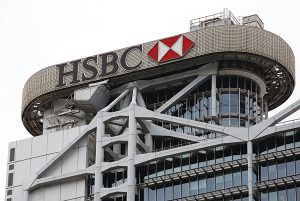Bloomberg
HSBC Holdings Plc will consider a special payout after the sale of its Canadian unit as the bank attempts to face down a campaign from its top shareholder to pursue a wider break-up of the business.
Reporting fourth-quarter results that beat analyst estimates, HSBC said it may pay a special $0.21 dividend next year after the completion of the transaction amid an ongoing tussle with Ping An Insurance Group Co of China. The bank announced the all-cash sale of HSBC Canada in November as it seeks to convince investors its plan to refocus on Asia is a better bet than Ping An’s call to consider spinning out its business in the region.
“Our first and priority use of some of those buyback proceeds will be a $0.21 special dividend,†Chief Executive Officer Noel Quinn said in an interview with Bloomberg Television. “As we close the transaction we’ll make a decision on how much additional distribution we do via buyback and how much we retain for internal use.â€
HSBC’s adjusted pretax profit rose 92% to $6.83 billion in the fourth quarter, above analyst estimates compiled by Bloomberg. The lender, like other global financial services firms, has benefited from rising interest rates. Its net interest margin — a key measure of profitability — rose to 1.74% in the quarter, up from 1.19% a year earlier.
The lender retained its existing guidance of net interest income of $36 billion for 2023, disappointing some analysts. It also said it would target 2023 adjusted cost growth of about 3%, up from 2% previously.
In a move that will prove especially popular to its large investor base in Hong Kong, HSBC said it would resume paying quarterly dividends from the first quarter this year. It said it has brought forward its consideration of buybacks to the first quarter of 2023 and will look other potential buybacks, in addition to any existing program. HSBC previously said it would only resume buybacks once its core capital moved back within its target range of 14% to 14.5%.
Cost pressures are one of the biggest issues facing the bank. Then Chief Financial Officer Ewen Stevenson told a conference in September that rising inflation could force the lender to significantly increase salaries and that “brutal†cuts could be needed to keep a lid on costs.
The lender’s costs rose 2% in the period due to technology spending and performance related pay. Overall for last year the bank’s variable pay pool shrank to $3.36 billion from $3.5 billion in 2021 as it paid less to investment bankers.
HSBC is among banks who have been seeking to increase shareholders returns as rising interest rates propel profits, but its outlook has long been complicated by geopolitical tensions. On the credit side, the bank’s results were hampered as expected credit losses almost tripled to $1.4 billion in the quarter, primarily due to corporate exposures in the UK and mainland China commercial real estate.
HSBC is in the midst of an overhaul of its global operations, most recently announcing the sale of its Canadian unit to Royal Bank of Canada, to refocus on Asia. That deal is expected to close later this year and generate a pretax gain of $5.7 billion.
The bank is also looking to develop its operations in some of Asia’s biggest markets. HSBC has put a renewed focus on building up its Indian unit and plans to open an onshore private banking service for the country’s wealthiest citizens this year. Quinn said in a phone interview that the lender continued to assess potential acquisitions in the region.
 The Gulf Time Newspaper One of the finest business newspapers in the UAE brought to you by our professional writers and editors.
The Gulf Time Newspaper One of the finest business newspapers in the UAE brought to you by our professional writers and editors.
